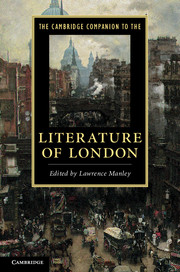Book contents
- Frontmatter
- Introduction
- 1 Images of London in medieval English literature
- 2 London and the early modern stage
- 3 London and the early modern book
- 4 London and poetry to 1750
- 5 Staging London in the Restoration and eighteenth century
- 6 London and narration in the long eighteenth century
- 7 London and nineteenth-century poetry
- 8 London in the Victorian novel
- 9 London in Victorian visual culture
- 10 London in poetry since 1900
- 11 London and modern prose, 1900-1950
- 12 Immigration and postwar London literature
- 13 Writing London in the twenty-first century
- 14 Inner London
- Guide to further reading
- Index
13 - Writing London in the twenty-first century
Published online by Cambridge University Press: 28 September 2011
- Frontmatter
- Introduction
- 1 Images of London in medieval English literature
- 2 London and the early modern stage
- 3 London and the early modern book
- 4 London and poetry to 1750
- 5 Staging London in the Restoration and eighteenth century
- 6 London and narration in the long eighteenth century
- 7 London and nineteenth-century poetry
- 8 London in the Victorian novel
- 9 London in Victorian visual culture
- 10 London in poetry since 1900
- 11 London and modern prose, 1900-1950
- 12 Immigration and postwar London literature
- 13 Writing London in the twenty-first century
- 14 Inner London
- Guide to further reading
- Index
Summary
On the evening of Wednesday 6 July 2005, when London was celebrating the news announced that day that the city had won the bid for the 2012 Olympic Games, a fledgling novelist, Chris Cleave, attended the launch party of his first novel, Incendiary, which was to be published the following morning. His book was resolutely concerned with life in London in the shadow of the atrocities of 9/11, the US-led invasion of Iraq and Afghanistan, the bombings of trains in Madrid on 11 March 2004, and the infamous events at Abu Ghraib prison. As Cleave subsequently explained, 'The airwaves were filled with body counts and brutish ideologies, and I needed to write something to remind myself of the simple human cost of this folly. And I think I wanted my son, when he was older, to understand something of the febrile nature of the times he was born into.' In the novel, Cleave depicted London struggling to cope in the wake of a genocidal terrorist attack on a Premier League soccer match attended by thousands of fans between two major clubs, Arsenal and Chelsea, at which the unnamed narrator loses her husband and son amidst the carnage. Penned as an extended letter from the narrator to Osama Bin Laden, Cleave's ambitious and often remarkable debut novel explored the imagined social and psychological consequences of a city lost to terror. Incendiary was toasted long into the night of 6 July.
- Type
- Chapter
- Information
- The Cambridge Companion to the Literature of London , pp. 241 - 260Publisher: Cambridge University PressPrint publication year: 2011



